Sarah Sundin's Blog, page 529
March 12, 2011
Today in World War II History
70 Years Ago—Mar. 12, 1941: Premiere of Frank Capra movie Meet John Doe, starring Gary Cooper and Barbara Stanwyck.
Published on March 12, 2011 03:00
March 11, 2011
It's My Blogoversary!
 Today I'm celebrating the second anniversary of my blog!
Today I'm celebrating the second anniversary of my blog!Leave a comment on any of this week's posts here or on Facebook for a chance to win a copy of your choice of my three novels: A Distant Melody, A Memory Between Us (available now), or Blue Skies Tomorrow (coming August 2011). Please leave your email address in the following format: sarah[at]sarahsundin[dot]com, so I can contact you if you win. US or Canada only, please. I'll announce the winner on Saturday, March 12.
I started the blog only because my lovely website designer made me. She set it up in case I ever decided to blog, which I had no intention of doing. I started with random funny stories and devotions, then added the "Today in World War II History" posts in June 2009 to coincide with the 65th anniversary of the D-Day landings. Not until last September did I hit my blogging stride with posts on World War II on Mondays, book or book club features on Wednesdays, and devotions on Fridays. So it took me a while. I'm a slow learner.
The Lord chose this week to remind me I can do nothing on my own. On Saturday night my husband asked if I was teaching Sunday school the next day. Nope, I said. The next morning in church, we sang a song with the line, "When You call, I won't refuse." I smiled. Just like Moses and the burning bush. Just like the devotion I'd written that week...for the Sunday school lesson...I was teaching...that morning! I broke out in a cold sweat. Yes, an actual cold sweat. I turned to my husband and whispered the story to him. He gave me one of those "you're an idiot, but you're my idiot" looks, and I fled the church service (bad Sarah) and wrote up my lesson.
God used my idiot-moment to embellish the lesson. I shared the story with the fourth- and fifth-graders and drove the point home. God uses whiny Moses and doofus Sarah - and He can use you too. He uses us in spite of our weaknesses. In fact, I'm convinced He uses because of our weaknesses, so His power shines all the brighter.
Thanks to all of you who have accompanied me on my stumbling, rambling journey. May He do great things in your life!
Published on March 11, 2011 05:00
Today in World War II History
70 Years Ago—Mar. 11, 1941: Lend-Lease Act passed by Congress and signed by President Roosevelt, to sell military supplies to Britain with delayed payment.
Published on March 11, 2011 03:00
March 10, 2011
Today in World War II History
70 Years Ago—Mar. 10, 1941: British Halifax bomber makes combat debut in raid to Le Havre.
Published on March 10, 2011 03:00
March 9, 2011
Book Club Beat - The Shack by William Paul Young
This week I'm celebrating the second anniversary of my blog! Leave a comment on any of this week's posts here or on Facebook for a chance to win a copy of your choice of my three novels: A Distant Melody, A Memory Between Us (available now), or Blue Skies Tomorrow (coming August 2011). Please leave your email address in the following format: sarah[at]sarahsundin[dot]com, so I can contact the winner. US or Canada only, please. I'll announce the winner on Satu
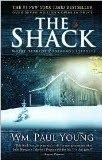 rday, March 12.
rday, March 12.
Welcome to Book Club Beat, where book clubs share about their discussions. Today I have a special guest, Nora St. Laurent. In addition to running two "live" book clubs, Nora also coordinates the ACFW (American Christian Fiction Writers) on-line book club, plus The Book Club Network, an on-line community for book club leaders, book club members, and authors (http://www.bookfun.org/).
Welcome, Nora! Please tell us about your book club meeting.
Book club name and/or location: Finding Hope book club, which meets in a bookstore in Georgia.
Title and Author: The Shack by William Paul Young.

What it's about:
Mackenzie Allen Philips' youngest daughter, Missy, has been abducted during a family vacation and evidence that she may have been brutally murdered is found in an abandoned shack deep in the Oregon wilderness. Four years later in the midst of his Great Sadness, Mack receives a suspicious note, apparently from God, inviting him back to that shack for a weekend. Against his better judgment he arrives at the shack on a wintry afternoon and walks back into his darkest nightmare. What he finds there will change Mack's world forever.
Were discussion questions available? Were they helpful?
Yes, there are questions in the back of the book. However, since we had a visit by the author, we listened to him speak, and then he took questions from the audience.
What we liked about the book:
My group loved the book. After listening to the author explain parts of the book and why he wrote them, we loved it even more.
Anything we would change about the book?
To be honest not many of us liked the cover of the book. It was a book that I never would have picked up because of the cover.
Fun connections (did the story inspire food, decorations, etc.? Did you have an author visit or phone call?):

Several people brought fun food but none was inspired by the book.
We did have a visit by the author. He first came to the store and did a book signing. The line wrapped around the store and every person got his full attention. I delighted to watch people share what the book meant to them. When he was done signing, he gave each person a hug.
Word got out that William Paul Young would be speaking at our book club that evening, so we had to find another location to seat the larger crowd.
When he came to speak, he shared his amazing journey. His wife bugged him about writing a story to his children that they could keep. He decided to write a book about the important things in life he wanted to share with his kids. He wrote on a train to and from work, then went to Kinko's and made booklets for his kids. His kids gave it to their friends, and someone said he should publish it as a book.
Deep connections (this story made us think about the following discussion topics):
This story sparked lots of discussion. People cried when they shared parts that deeply touched them.
Do you recommend this book for other book clubs?
Yes, there will be lively discussion. But there has been a lot of controversy about this book. People have asked me what I thought of William Paul Young. I thought he was sincere. It was amazing to see how many people were touched by his book. So, yes, I recommend it, but beware of the wide variety of reactions.
Thanks, Nora, for sharing about your book club meeting with us! Sounds very interesting.
If you belong to a book club and would like your group to be featured on this blog, let me know! Pictures of the book club can be included if you'd like. Christian or "clean secular" fiction/nonfiction only please. The questionnaire is short, and I'll obtain the book cover and story blurb.
If you're looking for a book club, check out the Book Club Network at http://www.bookfun.org/ , an on-line meeting place for Christian book club members and authors. Over 900 members and it's only a few months old! Join the fun!
 rday, March 12.
rday, March 12.Welcome to Book Club Beat, where book clubs share about their discussions. Today I have a special guest, Nora St. Laurent. In addition to running two "live" book clubs, Nora also coordinates the ACFW (American Christian Fiction Writers) on-line book club, plus The Book Club Network, an on-line community for book club leaders, book club members, and authors (http://www.bookfun.org/).
Welcome, Nora! Please tell us about your book club meeting.
Book club name and/or location: Finding Hope book club, which meets in a bookstore in Georgia.
Title and Author: The Shack by William Paul Young.

What it's about:
Mackenzie Allen Philips' youngest daughter, Missy, has been abducted during a family vacation and evidence that she may have been brutally murdered is found in an abandoned shack deep in the Oregon wilderness. Four years later in the midst of his Great Sadness, Mack receives a suspicious note, apparently from God, inviting him back to that shack for a weekend. Against his better judgment he arrives at the shack on a wintry afternoon and walks back into his darkest nightmare. What he finds there will change Mack's world forever.
Were discussion questions available? Were they helpful?
Yes, there are questions in the back of the book. However, since we had a visit by the author, we listened to him speak, and then he took questions from the audience.
What we liked about the book:
My group loved the book. After listening to the author explain parts of the book and why he wrote them, we loved it even more.
Anything we would change about the book?
To be honest not many of us liked the cover of the book. It was a book that I never would have picked up because of the cover.
Fun connections (did the story inspire food, decorations, etc.? Did you have an author visit or phone call?):

Several people brought fun food but none was inspired by the book.
We did have a visit by the author. He first came to the store and did a book signing. The line wrapped around the store and every person got his full attention. I delighted to watch people share what the book meant to them. When he was done signing, he gave each person a hug.
Word got out that William Paul Young would be speaking at our book club that evening, so we had to find another location to seat the larger crowd.
When he came to speak, he shared his amazing journey. His wife bugged him about writing a story to his children that they could keep. He decided to write a book about the important things in life he wanted to share with his kids. He wrote on a train to and from work, then went to Kinko's and made booklets for his kids. His kids gave it to their friends, and someone said he should publish it as a book.
Deep connections (this story made us think about the following discussion topics):
This story sparked lots of discussion. People cried when they shared parts that deeply touched them.
Do you recommend this book for other book clubs?
Yes, there will be lively discussion. But there has been a lot of controversy about this book. People have asked me what I thought of William Paul Young. I thought he was sincere. It was amazing to see how many people were touched by his book. So, yes, I recommend it, but beware of the wide variety of reactions.
Thanks, Nora, for sharing about your book club meeting with us! Sounds very interesting.
If you belong to a book club and would like your group to be featured on this blog, let me know! Pictures of the book club can be included if you'd like. Christian or "clean secular" fiction/nonfiction only please. The questionnaire is short, and I'll obtain the book cover and story blurb.
If you're looking for a book club, check out the Book Club Network at http://www.bookfun.org/ , an on-line meeting place for Christian book club members and authors. Over 900 members and it's only a few months old! Join the fun!
Published on March 09, 2011 05:00
Today in World War II History
70 Years Ago—Mar. 9, 1941: Italians launch offensive in Albania, but are repelled by the Greeks. Japanese establish intelligence network in San Diego CA to spy on US shipping.
Published on March 09, 2011 03:00
March 7, 2011
Make It Do - Meat and Cheese Rationing in World War II
This week I'm celebrating the second anniversary of my blog! Leave a comment on any of this week's posts here or on Facebook for a chance to win a copy of your choice of my three novels: A Distant Melody, A Memory Between Us (available now), or Blue Skies Tomorrow (coming August 2011). US or Canada only, please. I'll announce the winner on Saturday, March 12.
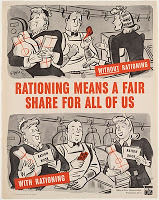 Rationing of meat and cheese was an important part of life on the US Home Front. A complex and constantly changing system kept grocery shoppers on their toes.
Rationing of meat and cheese was an important part of life on the US Home Front. A complex and constantly changing system kept grocery shoppers on their toes.
Why meat and cheese?
The United States produced meat and cheese for her civilians and military, and also for her Allies. During World War I, food shortages were a serious problem, with hoarding, escalating prices, and rushes on stores. When World War II started, the government reduced deliveries to stores and restaurants, instituted price controls, and urged people to voluntarily reduce consumption. Britain had already instituted a point-based rationing system and had found it effective, so the United States decided to implement a similar program in 1943. Rationing made sure everyone got a fair share.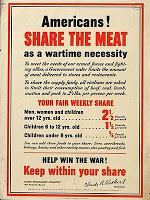
What was rationed?
On March 29, 1943, meats and cheeses were added to rationing. Rationed meats included beef, pork, veal, lamb, and tinned meats and fish. Poultry, eggs, fresh milk—and Spam—were not rationed. Cheese rationing started with hard cheeses, since they were more easily shipped overseas. However, on June 2, 1943, rationing was expanded to cream and cottage cheeses, and to canned evaporated and condensed milk.
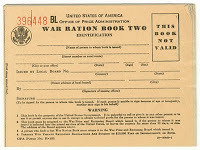
Ration Books
War Ration Books Two, Three, and Four contained blue stamps for processed foods, and red stamps for meat, cheese, and fats. Each person received 64 red stamps each month, providing 2 pounds of meat and 4 ounces of cheese per week. The stamps were printed with a number for point value and a letter to specify the rationing period—such as N8. Rationing calendars in newspapers declared which stamps were current and for how long. To prevent fraud, the stamps had to be torn off in the presence of the grocer. Stamps were good for one, two, five, or eight points, with no "change" given, so the shopper had to be careful to use the exact number of stamps. The system was simplified on February 27, 1944, when plastic tokens were issued as change.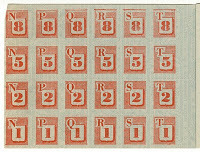
Points
Each cut of meat was assigned a point value per pound, based not on price or quality, but on scarcity. These point values varied throughout the war depending on supply and demand. "Variety meats" such as kidney, liver, brain, and tongue had little use for the military, so their point values were low. On May 3, 1944, thanks to a good supply, all meats except steak and choice cuts of beef were removed from rationing—temporarily.
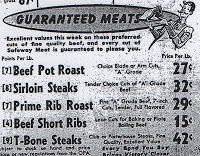
Shortages
As the Allies advanced, newly liberated countries required food their war-torn lands couldn't produce. America stepped forward to meet those needs, but shortages resulted on the Home Front. For Thanksgiving in 1944, the supply of turkeys was short, and on December 31, 1944, all meats were returned to rationing. Even with tightened rationing, a serious meat shortage developed in the spring and summer of 1945. San Diego reported a 55 percent decrease in the meat supply, and in San Francisco, only lamb and sausage were available. For the first time, even chicken and eggs were in short supply. Things improved after the victory parades, and on November 23, 1945 meat and cheese rationing came to an end.
Making Do
Throughout the war, American housewives learned to make do with less meat. Chicken and rabbit hutches sprang up in backyards, and people were encouraged to fish. Patriotic citizens observed "meatless Tuesdays" and cut meatless recipes out of newspapers and magazines. Soups, stews, and casseroles helped stretch the meat ration, and housewives learned to adapt recipes to organ meats and poultry.
How would you like to deal with meat and cheese rationing?
 Rationing of meat and cheese was an important part of life on the US Home Front. A complex and constantly changing system kept grocery shoppers on their toes.
Rationing of meat and cheese was an important part of life on the US Home Front. A complex and constantly changing system kept grocery shoppers on their toes.Why meat and cheese?
The United States produced meat and cheese for her civilians and military, and also for her Allies. During World War I, food shortages were a serious problem, with hoarding, escalating prices, and rushes on stores. When World War II started, the government reduced deliveries to stores and restaurants, instituted price controls, and urged people to voluntarily reduce consumption. Britain had already instituted a point-based rationing system and had found it effective, so the United States decided to implement a similar program in 1943. Rationing made sure everyone got a fair share.

What was rationed?
On March 29, 1943, meats and cheeses were added to rationing. Rationed meats included beef, pork, veal, lamb, and tinned meats and fish. Poultry, eggs, fresh milk—and Spam—were not rationed. Cheese rationing started with hard cheeses, since they were more easily shipped overseas. However, on June 2, 1943, rationing was expanded to cream and cottage cheeses, and to canned evaporated and condensed milk.

Ration Books
War Ration Books Two, Three, and Four contained blue stamps for processed foods, and red stamps for meat, cheese, and fats. Each person received 64 red stamps each month, providing 2 pounds of meat and 4 ounces of cheese per week. The stamps were printed with a number for point value and a letter to specify the rationing period—such as N8. Rationing calendars in newspapers declared which stamps were current and for how long. To prevent fraud, the stamps had to be torn off in the presence of the grocer. Stamps were good for one, two, five, or eight points, with no "change" given, so the shopper had to be careful to use the exact number of stamps. The system was simplified on February 27, 1944, when plastic tokens were issued as change.

Points
Each cut of meat was assigned a point value per pound, based not on price or quality, but on scarcity. These point values varied throughout the war depending on supply and demand. "Variety meats" such as kidney, liver, brain, and tongue had little use for the military, so their point values were low. On May 3, 1944, thanks to a good supply, all meats except steak and choice cuts of beef were removed from rationing—temporarily.

Shortages
As the Allies advanced, newly liberated countries required food their war-torn lands couldn't produce. America stepped forward to meet those needs, but shortages resulted on the Home Front. For Thanksgiving in 1944, the supply of turkeys was short, and on December 31, 1944, all meats were returned to rationing. Even with tightened rationing, a serious meat shortage developed in the spring and summer of 1945. San Diego reported a 55 percent decrease in the meat supply, and in San Francisco, only lamb and sausage were available. For the first time, even chicken and eggs were in short supply. Things improved after the victory parades, and on November 23, 1945 meat and cheese rationing came to an end.
Making Do
Throughout the war, American housewives learned to make do with less meat. Chicken and rabbit hutches sprang up in backyards, and people were encouraged to fish. Patriotic citizens observed "meatless Tuesdays" and cut meatless recipes out of newspapers and magazines. Soups, stews, and casseroles helped stretch the meat ration, and housewives learned to adapt recipes to organ meats and poultry.
How would you like to deal with meat and cheese rationing?
Published on March 07, 2011 05:00
Today in World War II History
70 Years Ago—Mar. 7, 1941: First British troops land in Greece to aid Greeks against Italians. Actor Jimmy Stewart inducted into US Army.
Published on March 07, 2011 03:00
March 6, 2011
Today in World War II History
70 Years Ago—Mar. 6, 1941: German planes begin dropping mines in Suez Canal to disrupt British shipping.
Published on March 06, 2011 03:00
March 5, 2011
Today in World War II History
70 Years Ago Today - Mar. 5, 1941: Britain severs diplomatic relations with Bulgaria, which has just joined the Axis.
Published on March 05, 2011 03:00



